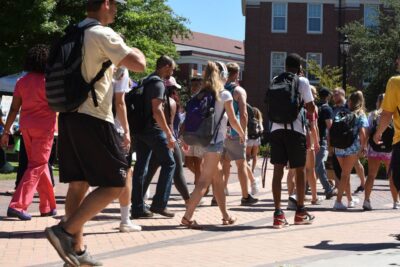Increasing campus climate survey response rate
The views and opinions expressed are those of the author and do not necessarily represent the views or opinions of EAB.
In October 2015, the Ohio Department of Higher Education (ODHE) introduced the Changing Campus Culture initiative with the goal of ending sexual violence at Ohio colleges and universities. Bowling Green State University (BGSU) participates in this campus climate survey; however, we need to increase participation in the climate survey, particularly of our students. In February 2021, when the most recent survey conducted, we had a 9% response rate from our randomly sampled students, though our goal was a 30% response rate.
As the co-director of the Center for Violence Prevention & Education (CVPE), I know it is essential to have good data and high response rates to this survey to help us guide action. Our center provides prevention education and support to students, faculty, and staff regarding power-based personal violence. The answers to the questions in this climate survey have a direct impact on how we do our work and what the needs are on our campus. We will gather information about how we investigate and respond to sexual violence on our own campus and to change the culture regarding sexual violence.
Additionally, having an appropriate response rate will reduce bias in climate survey data and increase knowledge in campus efforts to reduce sexual violence. Having better information at BGSU will impact the state of Ohio because it will help us strengthen our ability to better respond to and prevent sexual assault on our college campuses.
The Changing Campus Culture initiative benchmark results of all 2-and 4-year campuses that participate are a snapshot to provide a common set of data across all participating Ohio campuses, which provides data point comparisons for each question by sector. More than 31,000 students and more than 15,000 employees from 65 public and private campuses completed surveys. We are one of the few states in the nation that asks campuses to collect data at this level, which is a considerable amount of data for our state on an incredibly important topic.
To increase the response rate at BGSU, I utilized EAB’s Campus Climate Survey Launch Preparedness Toolkit to create a comprehensive plan for our next survey launch. I determined who would be part of the campus climate survey team, who campus partners should be, what the team charter is, and the timeline for the team.
Additionally, I developed marketing material ideas and an incentive strategy. I thought through survey emails and reminders, what other relevant data exists on campus that would be useful and who has access to it, and how and with whom to share campus climate survey findings. I am confident that utilizing this new, comprehensive campus-wide approach will help us get the word out and bring more folks into the planning process, which will result in a higher response rate as more individuals are aware of the survey.
It was incredibly useful to have the resources, support, and time to dedicate to this project, and to be able to discuss it with colleagues in the EAB fellowship. The knowledge I gleaned and the connections I have made in the fellowship have been really helpful to me as well—particularly given the unique challenges we have all faced in higher education the past two years. Having the knowledge that many of us are dealing with the same struggles, while still being able to share ideas, has been a huge takeaway from the fellowship.
More Blogs

A winning platform for higher education in a high-scrutiny era

Five trends that give community colleges a surprising edge in 2026
